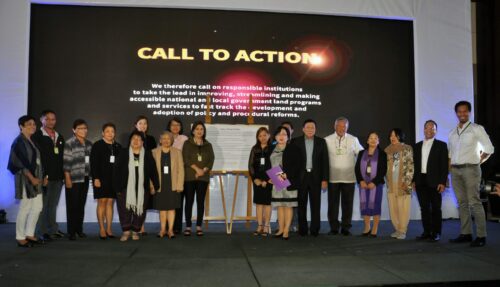USAID Leads Conference on Sustainable Land Governance

More than 350 experts and delegates gathered in Manila to exchange best practices and new approaches in land reform during the Conference on Sustainable Land Governance on February 8 to 9, 2017. The conference was organized by the U.S. Agency for International Development (USAID) through its Strengthening Urban Resilience for Growth with Equity (SURGE) Project, in partnership with the United Nations Human Settlements Programme (UN-Habitat) and the World Bank. It served as the most recent platform that elevated the discussion of sustainable land management and administration at the national level in the Philippines.
The two-day event featured a range of panel discussions on policy frameworks, urban land constraints, assets management for local government units, commercial pressures on land markets, technology solutions, resilient land management, and gender and social inclusion in property rights.
U.S. Ambassador to the Philippines Sung Kim, Philippines Department of Finance Secretary Carlos Dominguez III and USAID Mission Director Dr. Susan Brems graced the event.
“We are presented with a remarkable opportunity to work together towards sustainable land governance. Secure access to land is key to promoting broad-based, inclusive and sustainable growth of the Philippines,” said U.S. Ambassador to the Philippines Sung Kim.
The country continues to tackle challenges in land governance brought about by overlapping land management and administration policies, high incidence of fake double titles or rights recognition and outdated land use plans.
Nearly half of the Philippines’ 24.2 million land parcels remain untitled, according to the 2004 Land Administration and Management Project funded by Australian aid partnership with the World Bank. Among these untitled land parcels, the Asian Development Bank found that families and communities live on as many as 7.8 million residential parcels without secure land rights.
“As our population increased rapidly over the last few decades with our land policies hardly keeping pace, the phenomenon of landlessness has become more severe,” said Secretary Dominguez during his speech.
“Many of our settlements are vulnerable, our cities are congested, our forested areas have been stripped to make way for human habitation. We are truly facing a land governance crisis and must respond decisively on this,” he added.
Click here to watch the full speech of U.S. Ambassador Kim, and here to watch video insights of conference delegates.
The Conference on Sustainable Land Governance also hosted the launch of the Sustainable Urban Land Coalition, which called on the government to improve and make more accessible programs and services to fast track the development and adoption of land policy and institutional reforms.
The coalition, made up of more than 20 key representatives from national and local governments, business, international development and civil groups, announced their ten-point call to action on the last day of the event. The group emphasized to rationalize the mandates of land related agencies, prioritize the implementation of a massive national titling program, expedite resolution of land-related cases, and strictly enforce compliance of local government units on property valuation regulations, among others.
The SURGE Project facilitated the creation of the coalition, as part of USAID’s work in improving local land tenure security and land information management in USAID’s Cities Development Initiative (CDI) partner cities in the country.
In response, Office of the Cabinet Secretary Deputy Executive Director Jonas George Soriano, during closing remarks, said the call to action is timely as the new government is moving towards all the points raised in the adoption of a sustainable land governance to address the country’s land sector concerns.
“We are appealing to our friends from the local government units to push for changes in the government. If you want change, the President is asking the mayors and the governors to lead the way,” he said.
Meanwhile, National Economic and Development Authority (NEDA) Undersecretary Adoracion Navarro stressed that there is a need to strictly implement existing rules for effective land administration such as timely titling of lands and taxing idle lands sufficiently so that owners will put these lands to appropriate uses, which until now remains a big challenge.
“Institutional challenges on the other hand, also remains a challenge, such as multiple administration agencies, multiple laws, multiple land processes and multiple standards in land valuation,” she added.
“We hope the next steps of this conference will be guided by the policy directions of the Philippine Development Plan. The conference provided solution-oriented sessions, and we need to take advantage of technologies to improve management and access to land information, and on how computer-assisted disaster risk models can assist in land use management decisions at the local levels,” said Navarro.
The Philippine Development Plan (PDP) 2017-2022 was approved by the NEDA Board on February 20,
2017. According to NEDA, the PDP is the first medium-term plan to be anchored on a national long-term vision, the AmBisyon 2040, which represents the collective vision and aspirations of Filipinos. To set the direction for future growth, the PDP is adopting a national spatial strategy recognizing that population, geography and cities are engines of economic growth. It aims to decongest Metro Manila, connect rural areas to key growth areas and to improve linkages between settlements for higher resilience against disasters (NEDA, 21 February 2017).
This story was originally published in the Cities Development Initiative newsletter.

